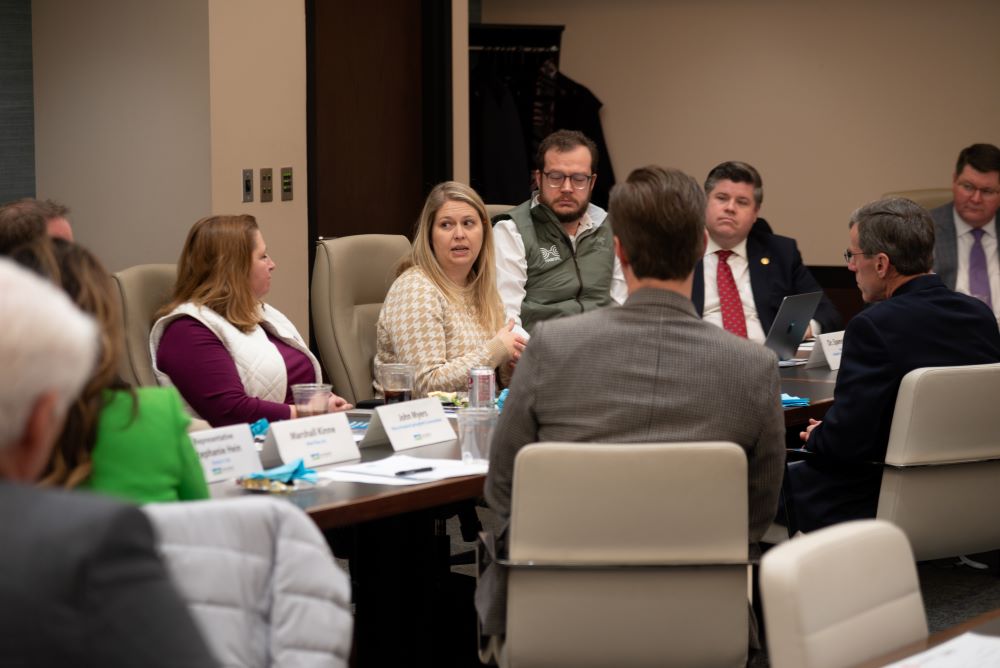Chamber board hosts state lawmakers to share key priorities

The Springfield Area Chamber of Commerce Board of Directors recently hosted regional state legislators for the annual Chamber Board Legislative Luncheon, providing an opportunity to discuss key business-community priorities for the 2025 legislative session.
Each year, the Chamber begins its advocacy efforts by facilitating a discussion between the board and regional legislators on key priorities for the current legislative session, running January through May. This event serves to strengthen connections between board members and elected officials in Jefferson City while ensuring that policymakers hear directly from business leaders about the real-world impact of legislative decisions.
For the 2025 legislative session, board members emphasized current and future workforce investments, responsible fiscal policies, the impact of Proposition A, addressing workforce barriers, and infrastructure investments to enhance economic development. See the full state legislative agenda here.
Legislators expressed a sense of optimism about the dynamics and anticipated progress this session would see in comparison to the past few years. They emphasized that Springfield and the surrounding region would play a significant role in shaping that progress.
“Springfield will have a seat at every single table,” said Representative Alex Riley. “There won’t be a bill on the governor’s desk that doesn’t have Springfield’s influence on it.”
The region continues to be well represented in both House and Senate leadership, as well as through key committee appointments and leadership roles.
“We are committed to working together for this community’s benefit,” said Representative Stephanie Hein.
The board emphasized the importance of continued or even greater investments in K-12 and higher education, along with expanded access to the Fast Track Workforce Incentive Grant. This program provides funding to support upskilling in high-demand fields, and raising the income eligibility threshold would allow more individuals to benefit. In Southwest Missouri, Ozarks Technical Community College and Missouri State University rank first and third, respectively, in statewide utilization of the program. Board members urged legislators to consider increasing the maximum income eligibility for individual or joint filers to expand access to this critical workforce training.
Board members also identified childcare as a workforce barrier, advocating for a tax credit approach that benefits employers, providers, and parents. Additionally, they emphasized the need to explore existing funding opportunities and reduce regulatory burdens to improve access and affordability.
The proposed tax credit approach for childcare is being considered for the second year in Jefferson City, with sponsorship from Representative Shields and Senator Hough. Representative Jeremy Dean, a member of the House Economic Development Committee, heard testimony on this tax credit proposal in late January—an encouraging indication of early legislative movement. Business and community members continue to share the importance of taking some steps, even if small, in this area to positively impact affordability, accessibility and quality of childcare options.
“We also need to let the providers tell us where they need us to help,” explained Representative Stinnett. “That way we can help them in every way that we can.”
While Hough indicated that the measure may not serve as a singular solution, he remains optimistic that the Senate will take a more proactive approach this year in advancing workforce and childcare initiatives.
The board also reaffirmed its support for policies that foster a business-friendly environment, highlighting the need to address burdens that exist within Proposition A and ensure that any future tax cuts include a revenue replacement to support crucial state programs.
Senator Hough noted that this session is expected to likely see a return to a more typical budget cycle, as much of the recent state funding was derived from federal sources that are no longer available. Senator Trent voiced several opportunities to enhance the state’s competitiveness by reducing certain taxes while ensuring that such measures do not place the state in a detrimental fiscal position.
The board also advocated for regional infrastructure investments, pointing to the success of PIC-West and the need for improvements along Highway MM in Republic. Representative Owen acknowledged the impact of these initiatives and noted that one-time funding requests are generally more viable than ongoing programs when navigating the state budget process.
Before concluding, Senator Trent encouraged business and community leaders to take an active role in shaping legislation, stating, “It’s not just elected officials’ state, it’s your state.”
Representative Jeremy Dean echoed this sentiment, underscoring the importance of bipartisan collaboration and input from community stakeholders.
Throughout the legislative session, Chamber staff and volunteer leaders will continue advocating in the State Capitol on behalf of our members and the broader community. Business leaders are encouraged to stay informed on key policy developments by following the Advocacy In Action eNewsletters.

